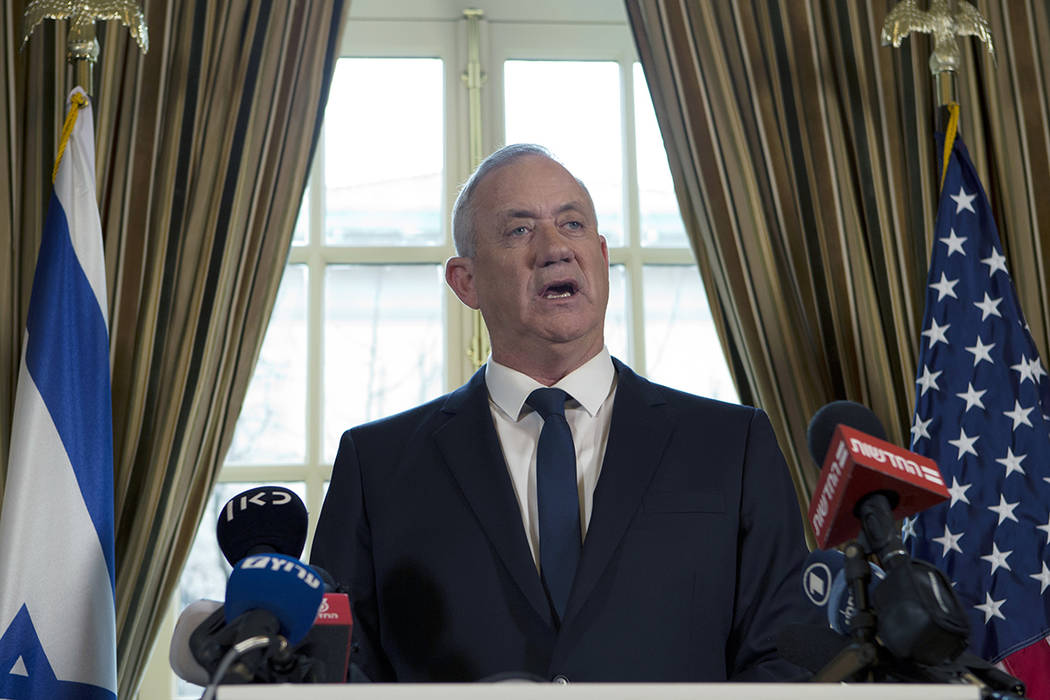Trump meets Israeli political rivals Netanyahu, Gantz

WASHINGTON — President Donald Trump greeted Israeli Prime Minister Benjamin Netanyahu and his political rival, Blue and White party lead Benny Gantz, in separate meetings at the White House on Monday.
Trump also announced on International Holocaust Remembrance Day that he will unveil his “deal of the century” Middle East peace plan on Tuesday morning.
Trump has courted Jewish-American voters, especially by fulfilling his promise to recognize Jerusalem as the capital of Israel and move the U.S. embassy there, even telling the American Israeli Council Summit in December that “You have to vote for me, you have no choice.”
Republican Jewish Coalition President Matt Brooks cited that promise — which past U.S. presidents have made but none have fulfilled — in anticipation of the peace plan’s release.
Trump “promised to recognize Jerusalem as the eternal and undivided capital of Israel, move the American embassy to Jerusalem, recognize Israeli sovereignty over the Golan Heights, dismantle ISIS, and confront Iran, and he has delivered. He will do the same with his peace plan,” Brooks said in a statement.
But Trump’s critics said the plan was designed to distract from the impeachment trial going on in the Senate.
“It’s clear that there is a political agenda that is serving for the impetus for this announcement. There might be multiple political agendas,” Jewish Democratic Council of America Executive Director Halie Soifer told the Review-Journal.
Soifer also voiced skepticism in the likelihood the plan will result in a deal because it has been crafted “without any consultation with the Palestinian Authority,” which cut off communication with the Trump White House in 2017.
Trump’s re-election campaign has focused on boosting his support among Jewish voters, 24 percent of whom supported Trump in 2016 according to exit polls.
To that sentiment, Soifer countered that Trump’s pro-Israel history may resonate with evangelical voters, but “there is one constituency that this is not going to appeal to, the overwhelming majority of Jewish Americans,” who, she said, are pro-Israel and support a two-state solution.
An invitation to Washington
Last Friday while in Israel, Vice President Mike Pence extended Trump’s invitation for Netanyahu to come to Washington to discuss the peace plan. Pence also announced that, at Netanyahu’s suggestion, he extended the invitation to Gantz, who will face Netanyahu at the ballot box again on March 2.
The White House wrapped up its peace plan months ago, but delayed releasing it rather than appear to take sides in Israel’s elections. Netanyahu ran for re-election in April and September, but both elections resulted in deadlocked parliaments.
“That’s a very strange system you have over there, wouldn’t you say that?” Trump wisecracked to Netanyahu as the two stood in the Rose Garden.
By inviting Gantz, the administration undercut criticism that Trump was siding with Netanyahu in an Israeli election.
“It did appear that this was put on hold for some time and the invitation to Gantz is a new approach ,” Soifer offered. “Still, it doesn’t change the fact that this plan is coming just one month in advance of an Israeli election.”
The invitation had put Gantz in a predicament. To refuse would be to snub Trump and close the door on a pact expected to appeal to his constituents. To accept would be to take a supporting role and, as Axios reported, look “like a second fiddle.”
After some back and forth, it was announced that Gantz would meet with Trump separately.
So Monday morning, Trump met the Israeli Prime Minister by the South Portico. In front of news media, the two leaders shook hands, strolled through the Rose Garden to the Oval Office where they posed for photos and fielded press questions.
“The deal of the century is the opportunity of the century, and we’re not going to pass it by,” said Netanyahu.
Second visit
Gantz arrived an hour later. After he tweeted a photo of himself shaking hands in the Oval Office with Trump, “a true friend of the State of Israel and the Jewish people.”
“Yes, it’s very, very hard to escape the impression that this was political,” observed Ghaith al-Omari of the Washington Institute of Near East Policy, as there is “no compelling policy reason to issue it now.”
Still al-Omari believes that the White House package ultimately could lead to a deal.
“The administration knows that the Palestinian Authority is going to say no,” al-Omari told the Review-Journal. The idea is to get Arab neighbors to pressure Abbas to not reject the plan immediately. It’s “maximum pressure” negotiating, and “the longer you say no, the worst things will get for you.”
Jared Kushner, the president’s son-in-law- and senior adviser, as well as the grandson of Holocaust survivors, has been Trump’s point person in charge of crafting the deal. “If Jared Kushner can’t get it done, it can’t be done,” Trump has said.
Chatting with reporters on Air Force One last week, someone asked Trump if he could broker a peace deal between Gantz ane Netanyahu. “Well, that would be maybe harder,” he answered.
Contact Debra J. Saunders at dsaunders@reviewjournal.com or 202-662-7391. Follow @DebraJSaunders on Twitter.
The Review-Journal is owned by the family of Las Vegas Sands Corp. Chairman and CEO Sheldon Adelson. Adelson is on the board of directors of the Republican Jewish Coalition.